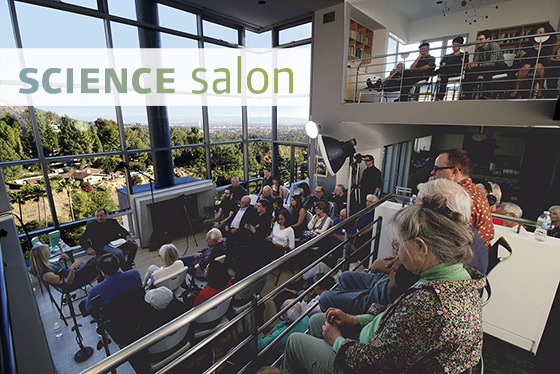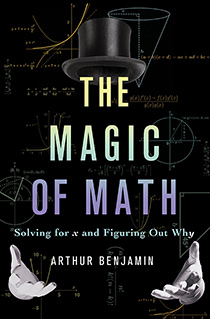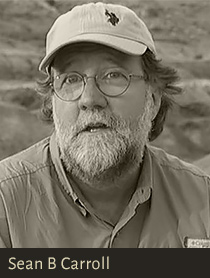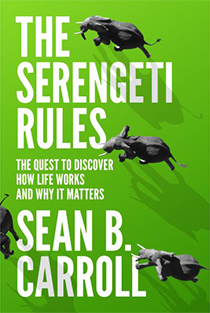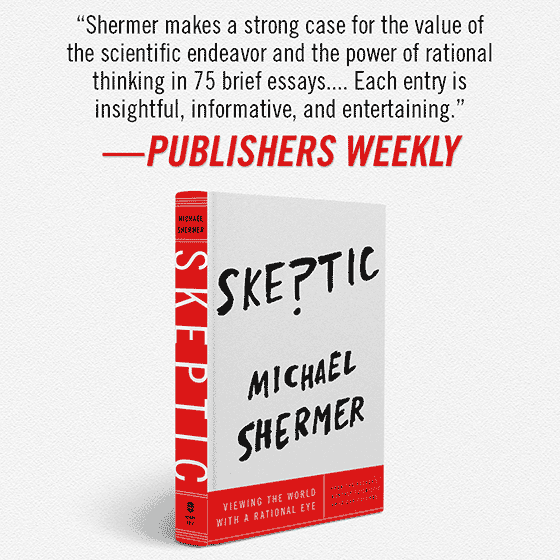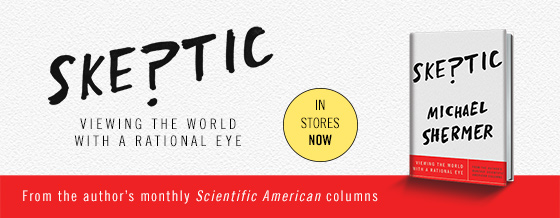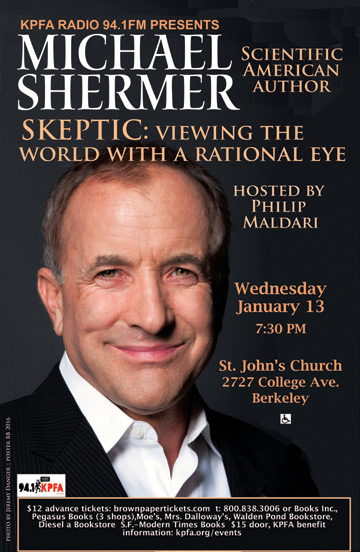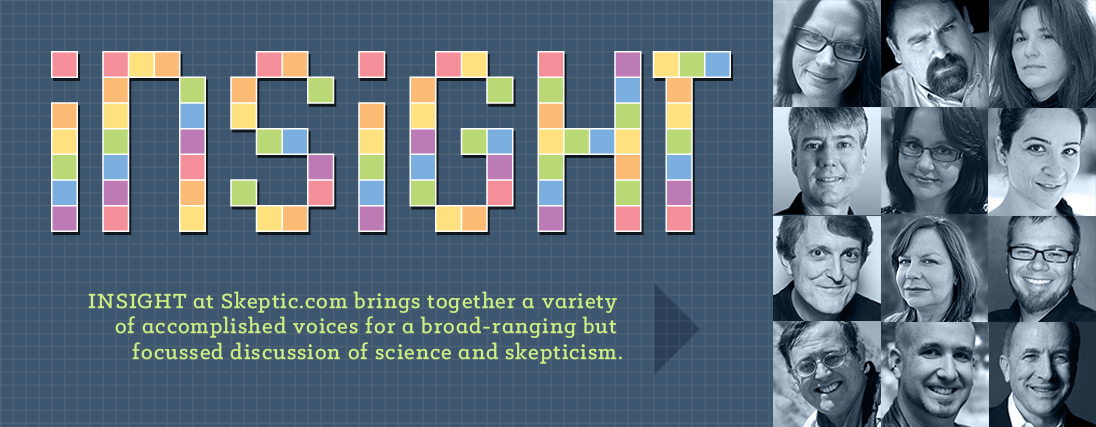In this week’s eSkeptic:
UPCOMING SCIENCE SALONS
The Magic of Math: Solving for x and Figuring Out Why
The Magic of Math is the math book you wish you had in school. Using a delightful assortment of examples—from ice cream scoops and poker hands to measuring mountains and making magic squares—this book empowers you to see the beauty, simplicity, and truly magical properties behind those formulas and equations that once left your head spinning. You’ll learn the key ideas of classic areas of mathematics like arithmetic, algebra, geometry, trigonometry, and calculus, but you’ll also have fun fooling around with Fibonacci numbers, investigating infinity, and marveling over mathematical magic tricks that will make you look like a math genius!
A mathematician who is known throughout the world as the “mathemagician,” Arthur Benjamin mixes mathematics and magic to make the subject fun, attractive, and easy to understand. In The Magic of Math, Benjamin does more than just teach skills: with a tip of his magic hat, he takes you on as his apprentice to teach you how to appreciate math the way he does. He motivates you to learn something new about how to solve for x, because there is real pleasure to be found in the solution to a challenging problem or in using numbers to do something useful. But what he really wants you to do is be able to figure out why, for that’s where you’ll find the real beauty, power, and magic of math.
If you are already someone who likes math, this Science Salon will dazzle and amuse you. If you never particularly liked or understood math, Benjamin will enlighten you and—with a wave of his magic wand—turn you into a math lover.
Order The Magic of Math from Amazon. We will also have Benjamin’s The Great Courses, including The Joy of Math, Discrete Mathematics, The Secrets of Mental Math, and Mathematics of Games and Puzzles, available for purchase at the event.
Call the Skeptics Society office now to reserve: 1-626-794-3119.
The Serengeti Rules: The Quest to Discover How Life Works and Why It Matters
How does life work? How does nature produce the right numbers of zebras and lions on the African savanna, or fish in the ocean? How do our bodies produce the right numbers of cells in our organs and bloodstream? In The Serengeti Rules, award-winning biologist and author Sean Carroll tells the stories of the pioneering scientists who sought the answers to such simple yet profoundly important questions, and shows how their discoveries matter for our health and the health of the planet we depend upon.
One of the most important revelations about the natural world is that everything is regulated—there are rules that regulate the amount of every molecule in our bodies and rules that govern the numbers of every animal and plant in the wild. And the most surprising revelation about the rules that regulate life at such different scales is that they are remarkably similar—there is a common underlying logic of life. Carroll recounts how our deep knowledge of the rules and logic of the human body has spurred the advent of revolutionary life-saving medicines, and makes the compelling case that it is now time to use the Serengeti Rules to heal our ailing planet. Order The Serengeti Rules from Amazon.
Call the Skeptics Society office now to reserve: 1-626-794-3119.
NEW BOOK AVAILABLE NOW!
Collected essays from bestselling author Michael Shermer’s celebrated columns in Scientific American
For fifteen years, bestselling author Michael Shermer has written a column in Scientific American magazine that synthesizes scientific concepts and theory for a general audience. His trademark combination of deep scientific understanding and entertaining writing style has thrilled his huge and devoted audience for years. Now, in SKE?TIC, seventy-five of these columns are available together for the first time; a welcome addition for his fans and a stimulating introduction for new readers.
Praise for the Book
“Michael Shermer is a beacon of reason in an ocean of irrationailty.” —Neil deGrasse Tyson
“Dense with facts, convincing arguments, and curious statistics, this is an ingenious collection of light entertainment for readers who believe that explaining stuff is a good idea.” —Kirkus Reviews
“Shermer makes a strong case for the value of the scientific endeavor and the power of rational thinking in 75 brief essays…. Each entry is insightful, informative, and entertaining.” —Publishers Weekly
“Since those old Scientific American issues have been recycled, revive the popular Shermer’s writings with this collection.” —Booklist
About this week’s feature
Michael Shermer’s new book, now available and published by Henry Holt/Macmillan, is a collection of his Scientific American essays that began in April of 2001. Shermer is most pleased with being able to bind the first 75 essays between two covers, and tell you about them here through the Introduction to the book, reprinted by permission of the publisher.
Enjoy this short essay and we hope you enjoy the book, which you can order now. You may also download a free audio recording (16MB MP3) of Michael Shermer reading the following Introduction.
Introduction: Skeptic
Viewing the World with a Rational Eye
by Michael Shermer
Ever since the early 1980s when I discovered the elegant and entertaining essays by the late Harvard evolutionary biologist and paleontologist Stephen Jay Gould—initially through his early essay collections in books (Ever Since Darwin and The Panda’s Thumb) and subsequently in monthly form as they rolled off the presses for Natural History magazine—I have maintained a deep passion to write science for general audiences. Not “popular science” writing per se, but more along the lines of what Gould strove for in his essays: deeper truths within scientific discoveries. As he wrote in the Preface to a later collection of essays, The Lying Stones of Marrakech:
I have tried, as these essays developed over the years, to expand my humanistic ‘take’ upon science from a simple practical device…into a genuine emulsifier that might fuse the literary essay and the popular scientific article into something distinctive, something that might transcend our parochial disciplinary divisions for the benefit of both domains (science, because honorable personal expression by competent writers can’t ever hurt; and composition, because the thrill of nature’s factuality should not be excluded from the realm of our literary efforts).
Transdisciplinary doesn’t begin to describe the breadth and depth of Gould’s oeuvre, and it has been a mark at which I have aimed in my own writing.
In a 2002 paper published in the journal Social Studies of Science entitled “This View of Science,” I presented the results of a content analysis I conducted of all 300 essays Gould penned in his 25-year monthly streak, revealing five deeper themes that appeared in them: Data-Theory, Time’s Arrow-Time’s Cycle, Adaptationism-Nonadaptationism, Punctuationism-Gradualism, and Contingency-Necessity. The first theme on how data and theory interact interested me the most, inspired as I was by a quote Gould occasionally employed from his hero Charles Darwin: “How odd it is that anyone should not see that all observation must be for or against some view if it is to be of any service!” The context for that quote, as I explicate in the first essay in this volume (in what I call “Darwin’s Dictim”), was that Darwin was challenged by his critics to just put his data forward and not to bother theorizing too much. But as the founder of evolutionary theory knew, the facts never just speak for themselves; they are always viewed through the lenses of theory. The two—observations and views, data and theory—are the conjoined twins of science.
That theme—the interplay of data and theory—is the central and unifying schemata in all of the essays in this volume. Gould completed his streak of 300 consecutive monthly essays in January of 2001. My first essay in Scientific American was in April of that year, but with a three month publication lead-time I actually penned the first one that January, close enough for an intellectual transition (if only in my mind). The 75 essays in this volume are from the first six and a quarter years of my own streak that—good health and fortune willing—will reach 300 in April of 2026, with several more essay volumes to come. I have grouped them into ten sections by topic within the larger data-theory schemata.
I. Science. In this section I set the tone of the entire series with Darwin’s Dictim in the first essay, giving examples of why data and theory are necessarily bound together, then move through essays whose themes related to general scientific principles and debates, such as what scientists should say when they’re wrong (“I was wrong” is a good start) and what it means to be wronger than wrong, scientism and why people look up to scientific superstars like Stephen Hawking, how to tell the difference between the ideas of a cutting edge scientist versus a cutting edge amateur, how to communicate science in both words and pictures, and the nature of scientific replication.
II. Skepticism. These essays range from classic skeptical debunkings (from the “faked” moon landing to 9/11 conspiracy theories) to the delicate balance between orthodoxy and heresy in science and when we should be skeptical of a heretical idea, and the fine art of baloney detection.
III. Pseudoscience and Quackery. There is also a difference between heresy and crazy, and the essays in this section explore why smart people fall for the latter, why being too open-minded is not always a good idea, why scams and cons work, and why bad ideas are dangerous to the point where they can kill.
IV. The Paranormal and the Supernatural. The essays in this section are about nothing. That is to say, there is no such thing as the paranormal and the supernatural; there is just the normal, the natural, and mysteries we have yet to explain. Talking to the dead, ESP and PSI, Bible codes, random electronic signals that sound like voices, and illusory patterns in Beatles’ albums, and what happens when a skeptic goes to the New Age capital of the world.
V. Aliens and UFOs. This is one of my favorite of all subjects in the skeptical pantheon of things to investigate, because there are really two different questions: Are aliens out there? and Have aliens come here? The answers to these two questions are “probably” and “probably not.” These essays consider what it means to search for extra-terrestrial intelligence, and how we would know when we made contact, a good reason why we have not yet heard from ET, what time travel means for the search, and what it feels like to be abducted by aliens.
VI. Borderlands Science and Alternative Medicine. For my money the most interesting ideas are not those that are obviously right or wrong, but those that, if they are true, would be revolutionary. Nanotechnology and what it means for immortality, cryonics, cloning, and cures for the common cold, and other remedies that promise us the world but rarely deliver.
VII. Psychology and the Brain. I am by training a psychologist so I am always interested in how our brains work, especially how we can so easily be fooled and mistaken in believing things that are not true. The essays in this section explore the many facets of human psychology as it relates to our beliefs about the world, especially how and when our intuitions serve us well or lead us astray.
VIII. Human Nature. Fundamental to who we are and why we think and act as we do is our evolved biological nature, and the essays here consider a number of highly controversial scientific theories in this regard. For example, are we noble or ignoble savages? Are we biologically predisposed toward making love and war? Can we unweave the heart to understand love and attachment? And what is happiness, anyway, and can science measure it?
IX. Evolution and Creationism. Ever since I was in college this topic has periodically erupted on the political and cultural landscape as scientists hope creationism goes away while creationists continue to evolve new strategies to wedge their ideas into the minds of the public, including and especially students. These essays dip into that controversy from a number of different points ranging from science to politics.
X. Science, Religion, Miracles and God. Outside of the specific case of creationism, which focuses on evolution as a perceived threat to a narrow sect of religious belief, there is arguably no more contentious topic in all of science today than how it relates to religion, miracles, and God (most notably the latter’s existence—or not). It seems to be a perennial topic for scientists and philosophers of all stripes to ring in on, with new books landing on my desk almost weekly since I began this column a decade and a half ago. That’s a lot of ink spilled to solve a problem that may be insoluble. Is it? The essays in this final section consider that question, and others, in what is essentially a guide to how to think about science and religion, even while offering my own often strongly worded opinions.
Writing monthly essays for Scientific American has been one of the most consistent joys in my life. I look forward each month to exploring a new theme or topic, chosen based on a number of criteria partially shaped by the editorial policies of the magazine, which has been in print for over a century and a half (so they know what they’re doing). These include new and newsworthy findings, discoveries, experiments, surveys, articles, and books in science that people care about and—fitting with my data-theory schemata—in each essay I try to connect them to some deeper theoretical idea with some relevance for society and culture.
My pathway in this series has been navigated around many rocky shoals by the remarkable editors at Scientific American, including most notably John Rennie, Mariette DiChristina, and Fred Guterl, all of whom have struck the perfect balance of editorial hand, improving my prose without rewriting to the point of unrecognizability. And I would especially like to thank the fact checkers at Scientific American, most notably Aaron Shattuck, who has caught some potentially embarrassing whoppers before they went to press. In cycling we have a saying: there are only two types of cyclists—those who have crashed and those who are going to crash. Well, in literature there are only two types of writers—those who need editing and those who are going to need editing. The “Skeptic” column—and by extension this book—would not be possible without such supreme editing. I thank them, and the readers of Scientific American who have consistently supported my column, for this great honor.
A final note on length and content
To the original essays of this collected series I have, where appropriate, added updates that include corrections and addendums of new information that has come to light since the original publication dates. As well, I have included the slightly longer versions of the essays as I originally penned them for Scientific American; that is, my original published essay length was one page with an illustration, which delimits the word count to around 700. But I usually wrote around 800–1000 words and then started cutting, a painful process that I endured by promising myself that one day the full-length versions would come to light (the “director’s cut” as it were). It’s not that there was anything wrong with the original 700-word pieces, only that they breathe a little freer when I’m allowed to flesh out a thought or explain an idea with a few additional sentences as I attempt to view the world with a rational eye, the reading line for SKE?TIC. ![]()
Michael Shermer Discusses Some of Highlights of His Career with Scientific American
FOLLOW MICHAEL SHERMER ON
Twitter • Facebook • Insight
Tonight on KPFA Radio 94.1FM, Philip Maldari Interviews Michael Shermer About His New Book: SKE?TIC
Tonight at 7:30pm
Listen to the interview online, or on your radio. KPFA broadcasts on 94.1 FM and KPFB 89.3 FM, Berkeley, and KFCF 88.1 FM, Fresno, California. Or, get advance tickets online for $12 ($15 at door) and watch the live interview at St John’s Presbyterian Church, 2727 College Avenue, Berkeley. Tickets are also available at Pegasus (3 sites), Moe’s, Walden Pond Bookstore, Diesel a Bookstore, Mrs. Dalloway’s, Modern Times (SF), or by calling 1-800-838-3006. More info.


